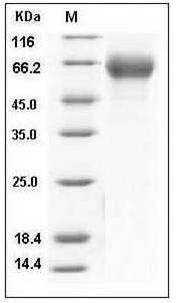-
Product Name
Mouse FGFR4/CD334 (His Tag) recombinant protein
- Documents
-
Description
Tyrosine-protein kinase that acts as cell-surface receptor for fibroblast growth factors and plays a role in the regulation of cell proliferation, differentiation and migration, and in regulation of lipid metabolism, bile acid biosynthesis, glucose uptake, vitamin D metabolism and phosphate homeostasis. Required for normal down-regulation of the expression of CYP7A1, the rate-limiting enzyme in bile acid synthesis, in response to FGF19. Phosphorylates PLCG1 and FRS2. Ligand binding leads to the activation of several signaling cascades. Activation of PLCG1 leads to the production of the cellular signaling molecules diacylglycerol and inositol 1,4,5-trisphosphate. Phosphorylation of FRS2 triggers recruitment of GRB2, GAB1, PIK3R1 and SOS1, and mediates activation of RAS, MAPK1/ERK2, MAPK3/ERK1 and the MAP kinase signaling pathway, as well as of the AKT1 signaling pathway. Promotes SRC-dependent phosphorylation of the matrix protease MMP14 and its lysosomal degradation. FGFR4 signaling is down-regulated by receptor internalization and degradation; MMP14 promotes internalization and degradation of FGFR4. Plays a role in postnatal lung development. May be involved in the development of skeletal muscle cell lineages.
-
Protein name
Fibroblast growth factor receptor 4
-
Protein short names
FGFR4; MGC20292; TKF; JTK2; FGFR-4; CD334
-
Uniprot ID
Q03142
-
Gene Name
Fgfr4; Fgfr-4; Mpk-11
-
Source/Expression Host
Human Cells
-
Expression Plasmid/cDNA
A DNA sequence encoding the extracellular domain (Met 1-Asp 366) of mouse FGFR4 (NP_032037.2) precursor was expressed with a polyhistidine tag at the C-terminus.
-
Protein Species
Mouse
-
Molecular weight
The secreted recombinant mouse FGFR4 consists of 361 amino acids and has a predicted molecular mass of 40 kDa. In SDS-PAGE under reducing conditions, the apparent molecular mass of rm FGFR4 is approximately 60-70 kDa due to glycosylation.
-
Purity
> 97 % as determined by SDS-PAGE
-
Activity
Measured by its ability to inhibit FGF acidic (aFGF / FGF1) dependent proliferation of Balb/c3T3 mouse embryonic fibroblasts. The ED50 for this effect is typically 10-100 ng/ml.
-
Validations

Mouse FGFR4 / CD334 Protein (His Tag) SDS-PAGE
Related Products / Services
Please note: All products are "FOR RESEARCH USE ONLY AND ARE NOT INTENDED FOR DIAGNOSTIC OR THERAPEUTIC USE"
